The best time to start the reconstruction of a war-torn country is during the crisis itself, and both displaced scientists and international research institutes can play a crucial role in this process. This was the key message from the four panellists who attended the TWAS Round Table at Trieste Next on 27 September.
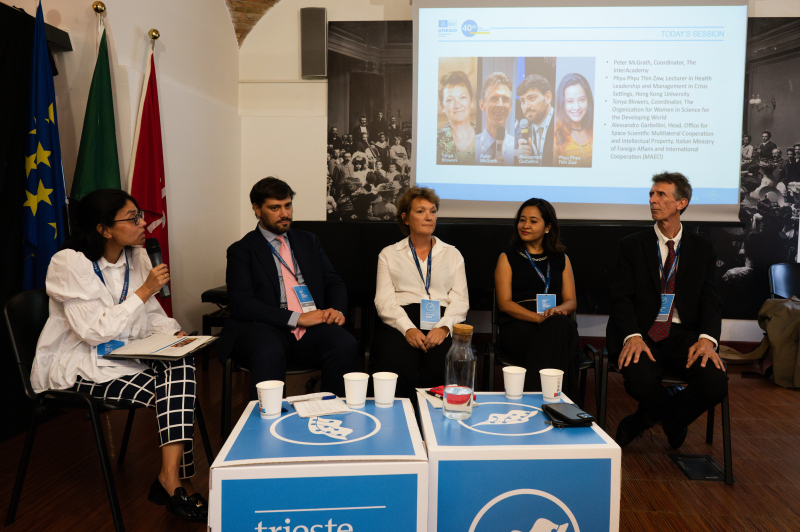
Counsellor Alessandro Garbellini, head of the Office for Space, Scientific Multilateral Cooperation and Intellectual Property, Italian Ministry of Foreign Affairs and International Cooperation (MAECI), was one of the panellists. "Displaced scientists are key: if we can support them while they are displaced, then they can be among the best helpers for their country and the reconstruction process," he said.
Since TWAS' foundation, in 1983, MAECI has granted seminal support to the Academy through core funding that allows TWAS to advance science in the developing countries.
Other speakers were Phyu Phyu Thin Zaw, lecturer in Health Leadership and Management in Crisis Settings, at The University of Hong Kong; Peter McGrath, coordinator of the InterAcademy Partnership (IAP) and of the TWAS Science Diplomacy Unit; and Tonya Blowers, coordinator of the Organization for Women in Science for the Developing World (OWSD).
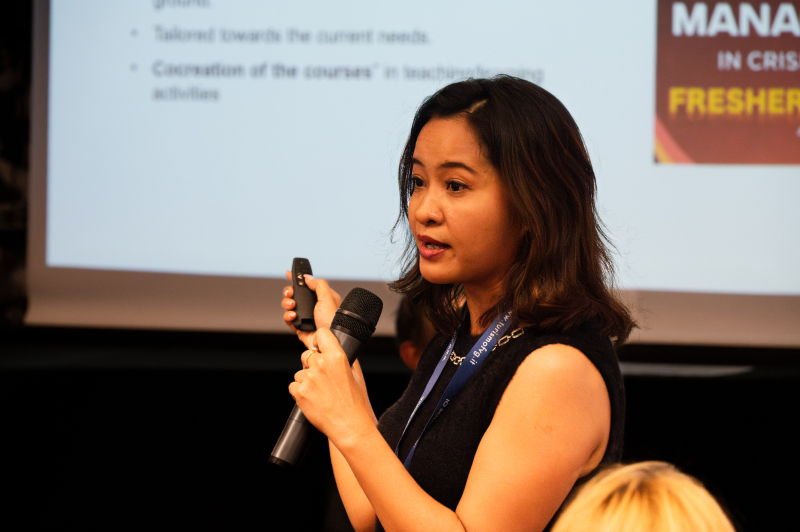
Trieste Next, the annual scientific festival held in Trieste since 2012, sets the stage for the in-depth analysis of topics at the interface between science, technology, and society. This year's theme was 'The Horizons of Intelligence. Knowledge and the Human-Technology Frontier'. The event took place on 27–29 September, and featured more than 300 scientists and several thousand visitors, offering 40 on-site interactive and hands-on exhibits. These included a booth where visitors learned about the activities of TWAS, IAP and OWSD, and played a board game about the Sustainable Development Goals with the Academy's staff.
The TWAS round table, titled 'Rebuilding scientific knowledge post-crisis', drew about 70 people for its audience. The panel addressed how to put displaced scientists' qualifications and experience at the service of both their host and home country, offering food for thought on an often-overlooked exodus of thousands of talented people.
Drawing from the experience of the TWAS-IAP-ISC Science In Exile Initiative, the session explored how scientific organizations can foster a cohesive response to support and integrate at-risk, displaced, and refugee scientists.
Scientists are not the only ones to leave their country. The global flow encompasses all kinds of people fleeing from persecution, conflict, human rights violations, famine, drought, and extreme climate events. UNHCR estimates that, by the end of 2023, 117.3 million people worldwide faced forced displacement, including those internally displaced. Epidemiologist Phyu Phyu Thin Zaw, a health systems specialist from Myanmar, is one of them.
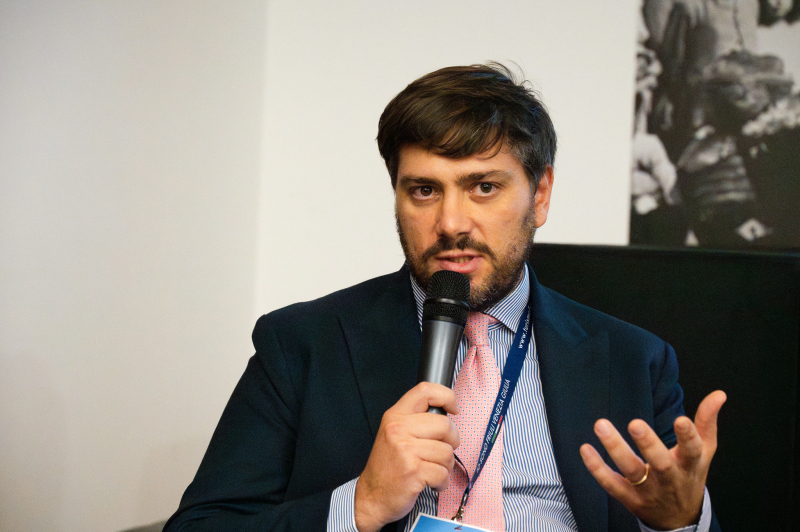
"Somebody may say that my country lost me, but I don't perceive it in this way. Rather, I like to think that I'm working to link my country to the rest of the world, through brain-bridging actions," she said during the event.
With 12 years of work experience in the government sector, Thin Zaw’s work focuses on equity, health, and education policies; Southeast Asia health systems and policies; poverty eradication; and human rights issues. She also serves as a technical advisor to think tanks and non-governmental organizations.
There are two pillars in Thin Zaw’s approach to supporting Myanmar and its scientists. The first is brain circulation, the outflow of highly skilled scientists who can potentially help their home countries by bringing back work experiences and knowledge gained abroad. The second is brain bridging, which suggests that displaced scholars can still act like a bridge between their country and the rest of the world, even if they do not go back or can’t. Both elements enable the reconstruction process of any country without waiting for the post-conflict era. "No brain is actually wasted, and we can make practical impact on the ground. Especially women, whose role may be, now more than ever, that of peacemakers," she said.
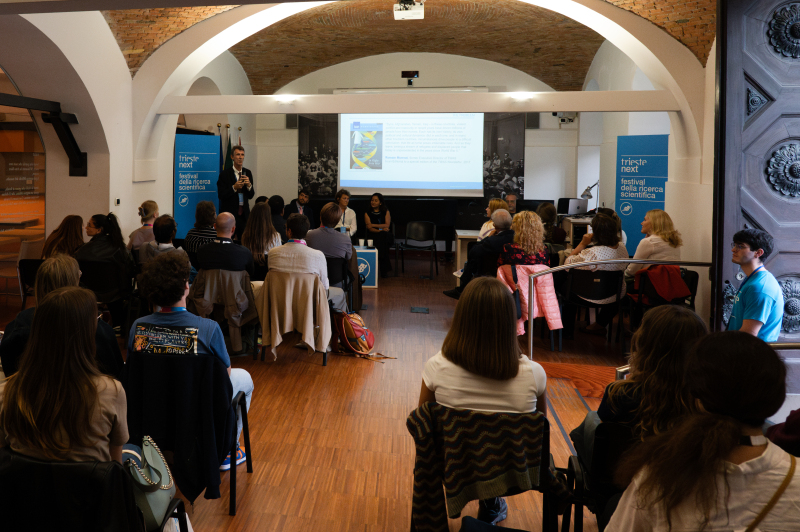
Scientists who remain in a country facing a crisis often cannot speak their minds, Thin Zaw emphasized, and therefore displaced scholars should assume the responsibility to speak up for them. She raised the example of the online Spring University Myanmar, a virtual online platform built up by young academics, including herself. It has 25,000 students enrolled, 200 faculty members, 12 diploma programmes and 37 management members. Also noteworthy is the School of Health, led by Thin Zaw, which offers a Diploma in Public Health Management in Crisis Settings with, currently, 90 students attending the lessons.
"To overcome the digital divide and protect scientists who are still in Myanmar and want to attend our courses, we used new technologies and innovative teaching methods," Thin Zaw explained. Courses are based on simulation and role-playing methods. They prioritize approaches that seek for solutions, rather than focusing on problems, and bring the students centre-stage, encouraging them to be co-creators of the courses.
Case studies include the latest health crisis situations. Teachers and students are covered by anonymity and confidentiality through avatars and nicknames, and are requested to avoid social media activity. "Together, and I mean you and I, we can do a lot. We can deliver new ideas and urge international organizations to be more proactive. We all have to change our mindset. But, please, don't wait," she urged.
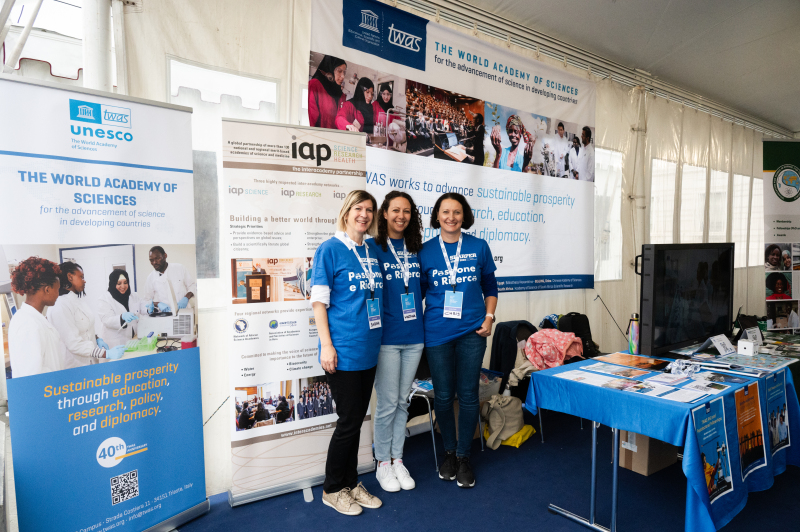
Later, Alessandro Garbellini stressed that science is extremely important for developing countries. As it is for the global North, science is the foundation of a good quality of life—granting basic needs such as food security, access to energy, and healthcare—also in the South.
"The global South doesn't need talents, doesn't miss brains. It needs opportunities. And we need to give these brains an opportunity for development," Garbellini said. "If developing countries lack financial resources, the UN cooperation system and UNESCO are there to help. How? Ensuring that young talents come to Trieste, study with ICTP and TWAS and engage with the international scientific community—to gain the capacity, once they are back home, to innovate and find the solutions to their local problems."
With TWAS Associate Programme Officer Payal Patel moderating, the panel examined the role of science diplomacy in settling disputes and reaching agreements. Science and diplomacy, Garbellini said, do not speak the same language. But if they are put together, they become a language that may foster logical reasoning between two parties that do not agree on some issues, and bring peace.
Garbellini mentioned SESAME synchrotron, a major cooperative infrastructure venture by scientists and governments in the Middle East, developed under the auspices of UNESCO, to investigate the structure of new materials and living matter. "Science needs diplomacy if we want to build the infrastructures needed for high-level research. And infrastructures, in turn, need big investments, and international cooperation," he added.
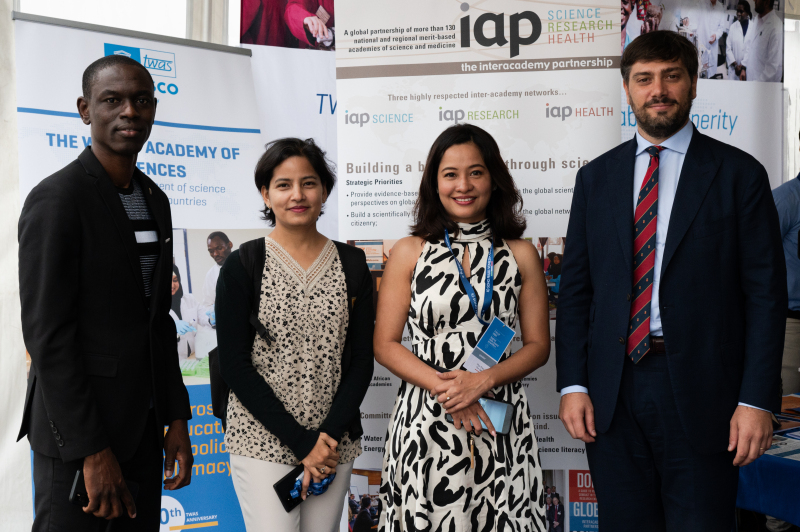
The endless exodus of scientists and the non-recognition of their qualifications held a central place in McGrath's presentation. "If countries have systems to support scientists when they arrive, it's a win for the scientists, because they can carry on with their career and research. And it's a win also for the host country, which gets the benefit of having trained professionals working there," he observed.
McGrath presented on Science In Exile initiative, a collaboration between TWAS, IAP and the International Science Council based in Paris, launched in 2021 to foster a cohesive response in support of at-risk, refugee and displaced scientists.
He highlighted the importance of the Science in Exile Declaration, released in April 2022 by Her Royal Highness Princess Sumaya bint El Hassan, UNESCO Goodwill Ambassador and Special Envoy for Science for Peace. The Declaration brings six commitments, McGrath recalled, including "Work towards rebuilding national scientific systems in the aftermath of conflict or disaster and support the voluntary, safe repatriation of scientists."
The challenges that displaced women scientists face were the focus of Tonya Blowers' talk. She mentioned the restrictions that these women experience, from limited mobility, bans on attending conferences, and meeting other scientists, worsened by the burden of caring after children and family. Then, she introduced the Women in Science Displacement Outreach Master's Program (OWSD-WISDOM), a fully funded Master’s scholarships offered to women refugee students in the global South pursuing master's degrees in the natural, engineering, information, and technology sciences. The two-year programme was launched in April 2024, quickly receiving 155 applications.
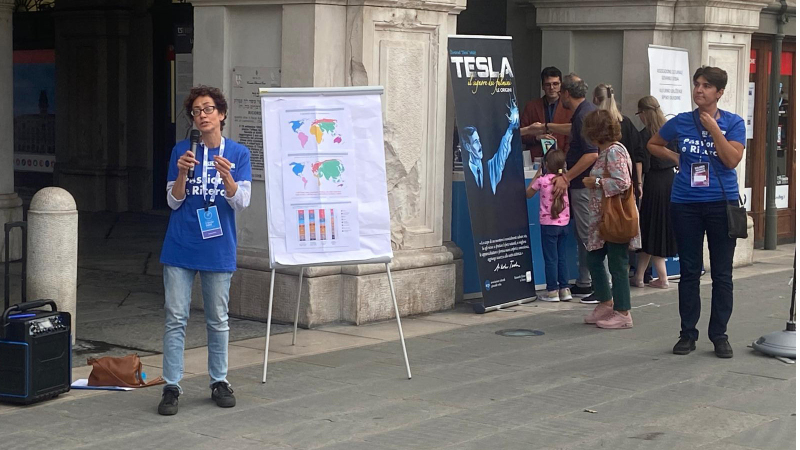
During Trieste Next, TWAS also participated in 'Street Science', an event that is part of SHARPER, a project supported by the European Commission for the realization of the European Researchers' Night. SHARPER stands for SHAring Researchers' Passion for Education and Rights, and the event aims at involving all citizens in discovering the research profession and understanding the role researchers play in building the future of society.
Sara Dalafi, a TWAS secretary member in the Science Diplomacy Unit, presented on 'Science Diplomacy for Climate Justice'. The short talk gave the street audience of about 20 people a global overview on the role and importance of science diplomacy on climate change, which especially affects developing countries, but should be addressed through joint efforts by all nations.
More pictures from the TWAS round table at 2024 Trieste Next are available on the TWAS Flickr pages.
Cristina Serra

